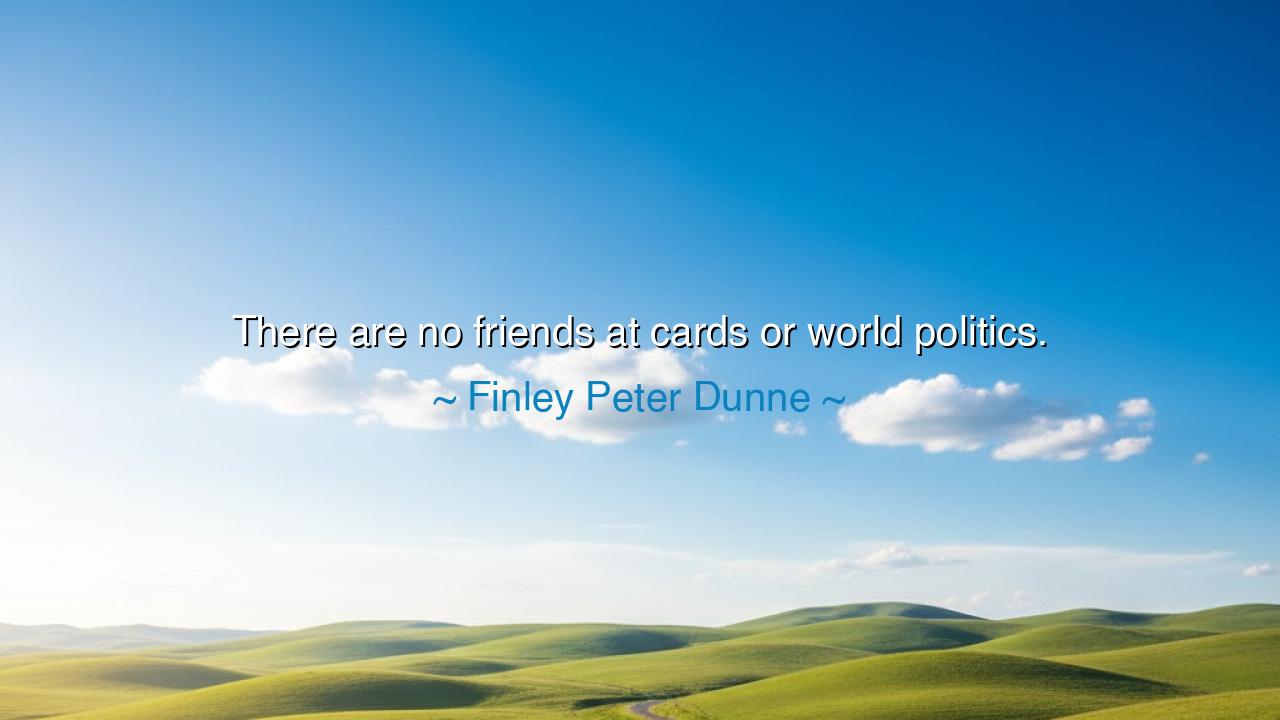
There are no friends at cards or world politics.






The words of Finley Peter Dunne cut with the sharpness of irony and truth: “There are no friends at cards or world politics.” In this saying, he unmasks the heart of rivalry, whether at the gambling table or in the council of nations. Both are games where gain for one means loss for another, where the mask of camaraderie hides the deeper current of self-interest. Friendship dissolves when stakes are laid, and what remains is calculation, cunning, and the ruthless pursuit of advantage.
The meaning is clear: in cards, the smile of a companion may conceal the hunger for victory, and the warmth of fellowship vanishes when the chips are counted. So too in world politics, the handshake between nations may glitter with promises, but behind it lies strategy, fear, and ambition. Allies remain so long as it suits their interest; when fortune shifts, even the closest companions may turn rivals. To expect loyalty in such arenas is folly, for the rules of the game demand otherwise.
History bears witness to this lesson. Consider the alliance of Stalin, Roosevelt, and Churchill during the Second World War. They stood together to defeat Hitler, yet even as the war raged, suspicion smoldered. Once the enemy was gone, the bond collapsed, and the Cold War began. Their unity had never been true friendship, but necessity, born of peril. Just as in a hand of cards, once the round was over, each played again for themselves.
The ancients too knew this truth. Thucydides wrote of the Peloponnesian War, where Athens and Sparta alike cloaked ambition in fine words of friendship and honor. Yet both betrayed allies when convenient, showing that in the contests of nations, loyalty bends before power. Here is Dunne’s wisdom made timeless: at the table of politics, as in gambling, no one plays for another’s gain, only for their own.
So let this be a warning to the children of the future: trust friendship in the hearth and in the heart, but not in the games of cards or the stage of world politics. In such places, rivalry is the law, and self-interest the only friend that never betrays. Yet, even knowing this, play the game wisely—for to be naive is to be devoured, but to see the truth clearly is to endure and prevail.






ALAvocado Linn
Dunne’s quote strikes a chord with the harsh realities of politics and high-stakes environments. It implies that both in games and politics, trust is temporary and fleeting, shaped by the desire to win. But it also makes me question: is it always this way? Can there be room for genuine collaboration and camaraderie even in such competitive settings? How can we foster real friendships in environments where self-interest often prevails?
MXNong thi my xoan
The statement by Finley Peter Dunne about no friends in cards or world politics seems to reflect the competitive and opportunistic nature of both arenas. But how much of this is shaped by the stakes involved? Can we truly never expect any loyalty in these areas, or is it just that trust is often overshadowed by the need to succeed? Is it possible to balance personal relationships with ambition in such cutthroat environments?
DTDao Trang
Dunne’s quote about cards and world politics speaks to the often transactional nature of these realms, where strategies and competition overshadow personal connections. It makes me think about how this principle might apply to the workplace or even social dynamics. How often do we find ourselves engaging in situations where we prioritize our own goals over others' well-being? Can true friendships exist in such environments, or do we have to redefine what friendship really means in these contexts?
ATDuy Anh Ta
This quote by Finley Peter Dunne suggests that both in card games and in politics, friendship takes a back seat to self-interest. It’s a bit of a cynical view, but in many ways, it reflects the truth of competitive situations. I wonder, though, can there be exceptions to this rule? Are there instances in politics or games where loyalty and camaraderie genuinely exist, or is the quote speaking to a more universal truth?
AArami
Finley Peter Dunne’s quote brings attention to the cold reality of both politics and games like cards—where alliances are often temporary, and everyone is ultimately looking out for their own interests. It makes me wonder, do we really ever have genuine friends in high-stakes environments like these, or is trust always conditional? Does this perspective on human relationships extend to other areas of life, such as business or even personal relationships?